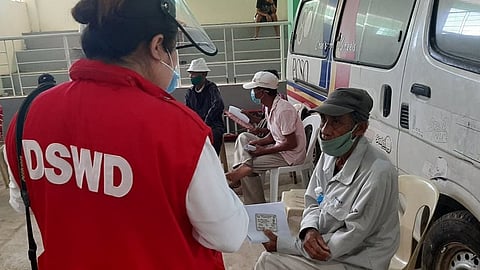
- NEWS
- the EDIT
- COMMENTARY
- BUSINESS
- LIFE
- SHOW
- ACTION
- GLOBAL GOALS
- SNAPS
- DYARYO TIRADA
- MORE

The over P229 billion budget for 2025 of the Department of Social Welfare and Development (DSWD) is intended to extend more responsive programs and services to the poor, marginalized, and disadvantaged sectors.
This was DSWD Secretary Rex Gatchalian reason to senators at the budget hearing for the agency on Monday, 16 September.
“Around 50 percent of our budget actually is in the 4Ps, as it is the biggest conditional development investment the government is making to uplift the lives of the poor to break into generational poverty,” the DSWD chief said before the Senate Committee on Finance chaired by Senator Imee Marcos.
The DSWD is proposing almost half of the agency’s budget for the 4Ps program that is currently benefiting around 4.3 million household-beneficiaries.
Based on the 2025 proposed DSWD budget, the agency will start implementing the “First 1,000-day grant” which will extend additional cash grants to 4Ps beneficiaries who are pregnant and nursing mothers to ensure the health and nutrition of their children during the critical first 1,000 days.
Aside from the 4Ps, the Social Pension for Indigent Senior Citizens (SocPen) is also one of the programs with the highest budget allotment with a proposed funding of P49.8 billion
This amount will cover the grants for the 4.85 million identified indigent seniors in the country, according to the DSWD chief.
“The SocPen Program, which provides regular financial assistance to elderly Filipinos living below the poverty line is subject to further qualifications provided in the law. In 2023, we successfully served 4.2 million indigent senior citizens, exceeding our target by 3.2 percent,” Secretary Gatchalian explained.
To further address the needs of the vulnerable sectors, Secretary Gatchalian said P35.1 billion will be directed to the agency’s social services for individuals and families in difficult situations.
“This will allow us to expand the reach and enhance our services,” the DSWD Secretary said.
The budget will cover the various services under the Assistance to Individuals in Crisis Situation (AICS) which include medical, burial, food, transportation, and cash assistance.
Under the Supplementary Feeding Program (SFP), the agency is eyeing P5.1 billion to fund feeding programs for children in Child Development Centers (CDC) and Supervised Neighborhood Play (SNP) under the supervision of the local government units (LGUs).
Gatchalian told senators that the financial allocation for the agency’s 76 centers and residential care facilities that provide protection, rehabilitation and care for the disadvantaged sectors of different categories.
“We have P2.9 billion for 2025 to enhance the quality of care provided in our facilities. This budget will support the continued operation of our CRCFs and the implementation of necessary improvements,” the DSWD chief said during the Senate finance committee’s budget deliberation.
To sustain the agency’s disaster preparedness and response efforts, the DSWD is proposing P1.9 billion for its Disaster Response and Rehabilitation Program (DRRP), which will cover the operational costs of the Department’s disaster risk reduction programs, as well as its countermeasure initiatives to climate change.
Secretary Gatchalian said the DSWD is proposing P1.2 billion for the Quick Response Fund (QRF) to assure the unhampered relief operations in disaster areas.
“To ensure continued preparedness and effective response to future disasters, the DSWD requests the support of the committee in maintaining adequate funding for the QRF and carefully review the proposed special provision for 2025 to avoid restrictions that may put us in a bind and hamper the swift delivery of response should disasters happen,” Secretary Gatchalian explained.
At the end of his budget presentation, the DSWD Secretary thanked the members of the committee for the opportunity to discuss the agency’s proposed budget for 2025.
“The budget we have presented outlines our commitment to serving the most vulnerable Filipinos through programs that address poverty, hunger, malnutrition, and disaster risk,” the DSWD chief said.
